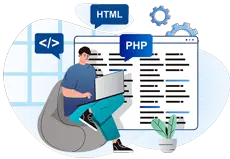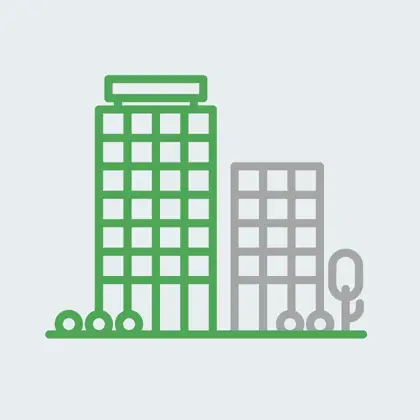100+ The opportunity to introduce the job of the Category PHP Developers
Hiring High-Paying PHP Developer Role l Aniday
1. What does a PHP Developer do?
PHP Developers typically program, develop software, design websites, technology companies, and many other types of businesses. Common duties of a PHP Developer include module programming, object-oriented programming, application design, deployment, troubleshooting, and developing web applications.
Most PHP developer positions require a bachelor's degree in computer science or a related field like web programming. Typical courses in the bachelor's program include web programming, data structures and algorithms, quantitative reasoning, computer architecture, object-oriented development, and operating systems.
A PHP Developer is in charge of several responsibilities whether working for a company or as a freelancer. Below are the responsibilities of a PHP Developer:
-
Code analysis - Ability to comprehensively analyze current or potential website requirements. PHP Developers collaborate with the development team to generate new ideas for creating or modifying websites and conduct research into the feasibility of those ideas to determine which idea to utilize. They design the features and functions to be incorporated into the website and ultimately decide on its final design and layout.
-
Database development and optimization - PHP Developers apply their technical knowledge to the development of the website. They ensure that the website is dynamic and integrate the necessary PHP scripts within it. Then they test the website to optimize the database.
-
Testing and deployment - test the website to detect, evaluate, and debug issues.
-
Maintenance and improvements - perform ongoing maintenance and updates after the website goes live online. They refine the website functions to enhance the user interface and display capabilities to ensure a good impression on users.
The duties of a PHP developer correlate with the duties of other software programmers.

2. What skills are required of a PHP Developer?
Typically, software development companies or third-party service providers abroad will have demand in recruiting PHP Developers. They are looking for full-stack PHP developers who have the required levels of education, training, experience, hard skills, and soft skills.
The characteristics of a full-stack PHP developer:
-
Education - Most developers have a bachelor's degree in computer science, information technology, software engineering, or other IT-related fields. To prepare for a career in PHP development, the bachelor's program must include courses in computer architecture, algorithms and data structures, object-oriented programming, operating systems, quantitative reasoning, and web programming.
-
Training - Computer science graduates pursuing a career in PHP development can enroll in two-to-four-month internships at IT companies, where they can gain hands-on skills in a real-world work environment. They can also take short PHP courses through online tutorials or face-to-face classroom courses. Short courses that can be attended include PHP for Beginners, PHP with MySQL, PHP with Laravel, and Object-Oriented PHP. The best websites to learn PHP are StackOverflow, Udemy, Codecourse, Stone River eLearning, PHP Manual, Killer PHP, PHP 101, Hacking with PHP, Tizag, Learn-PHP Interactive Tutorial, PHP: The Right Way, SitePoint PHP, and Basic PHP Knowledge.
-
Technical skills - Necessary for a PHP developer is knowledge of Ajax, jQuery and MySQL. Skills in CakePHP (open-source web framework) and PHPUnit (unit testing framework) also become important. Other useful skills to learn are APIs, Unix/Linux, and MVC framework architecture. All these technical skills will be highly important for developers whether working in a corporate environment or freelancing.
-
Work experience - The work experience of a full-stack PHP developer depends on the developer's level - junior, middle, and senior. A junior developer has under 2 years of experience. A middle developer has 2 to 4 years of experience. A senior developer has 5 to 8 years of experience, including experience resolving different complex issues.
-
Soft skills are a combination of personal attributes and characteristics, communication skills, social skills, people skills, social intelligence, and emotions that employees need to succeed in the workplace. These soft skills apply to PHP Developers as they work in a team-oriented environment where collaboration and coordination are necessary.
A PHP Developer must have the following soft skills:
-
Problem-solving - Many issues are discovered during the software development lifecycle. Developers need to identify and analyze the problem while also proposing viable solutions for it.
-
Critical thinking - Evaluating events and details of a particular problem before deciding and proposing the best solution. Critical thinking allows developers to test out a solution before opting for the most effective solution.
-
Adaptability - This refers to a developer's openness to learning new skills and taking on additional responsibilities. Adaptability allows a developer to adjust to changing situations and respond positively to feedback and criticism about the outcomes of their products.
-
Empathy - This allows developers to fully understand the issues their team is facing and helps them work together to find resolutions. Additionally, empathizing with intended users of the software lets developers see everything from their perspective so they understand what is required from the software being developed.
3. Minimum and maximum salary range for a PHP Developer
PHP Developers are responsible for writing the backend application logic. They often develop back-end components, connect software to other services, and support front-end developers by integrating their work into applications.
PHP is not an easy language to learn. It places a lot of pressure on developers to ensure that every application is stable and performs well. This can affect expectations regarding a PHP developer's salary, along with their level of experience, knowledge, and skills. Below are the average salaries for PHP developers in the United States and the factors influencing that salary range.















